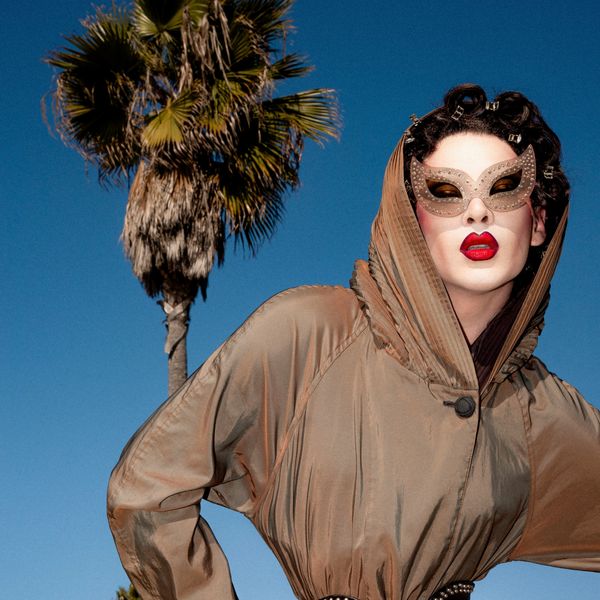
Violet Chachki Wants To Take Her Clothes Off
Story by Joan Summers / Photography by Thomas Angeli / Styling by Hunter Clem
Jun 06, 2024
Violet Chachki doesn’t want to talk about that television show anymore. She wants us to watch her take those very expensive clothes off.
Chachki has, by her own admission, grown up quite a bit since she was ripping off Crazy Horse routines for local drag shows in Atlanta, beset on all sides by opinionated pageant queens. She laughs when recounting those years, and clarifies she didn’t rip anything off; she simply paid homage to the most legendary cabaret in the world. “I had seen footage and videos from this DVD that Dita Von Teese starred in. She’s had a residency there before, and they filmed the whole show. I think I saw a bootleg version of it on Dailymotion,” she tells PAPER. Shoutout DailyMotion, which put many a glamor savant onto fashion shows and reference points back in the day, myself included. On the impact it had on her drag, she says: “I was like, oh my god, this place is amazing. It’s erotic, and feminine, fierce and sexy. This is exactly what my drag should be. This is exactly the kind of woman I’m inspired by.”
Twelve years on from those shows in Atlanta, the tenets of Crazy Horse are tightly woven into the fabric of Chachki’s creative identity. “In my shows, I’m an aerialist. I’m very acrobatic, and athletic, and you can see I’m always referencing Crazy Horse, even just flipping my hair and little things I picked up from there.” Better yet, her dedication to the craft paid off. After achieving “literally all my dreams,” like a Vogue Czechoslovakia cover last year, she landed her own guest spot in the show later this June, the fruits of numerous conversations with creative director Andrée Deissenberg over the years. “I would always invite her to my shows when I was in Paris, and there was always this conversation, like, maybe there’s a collaboration. Maybe there’s something we could do here, let’s see.” The resulting show, which runs from June 24 to June 28, doubles down on the interplay of drag and cabaret in her work. “The whole through line is introducing me to Crazy Horse, introducing Crazy Horse to me, and then mashing the two up.”
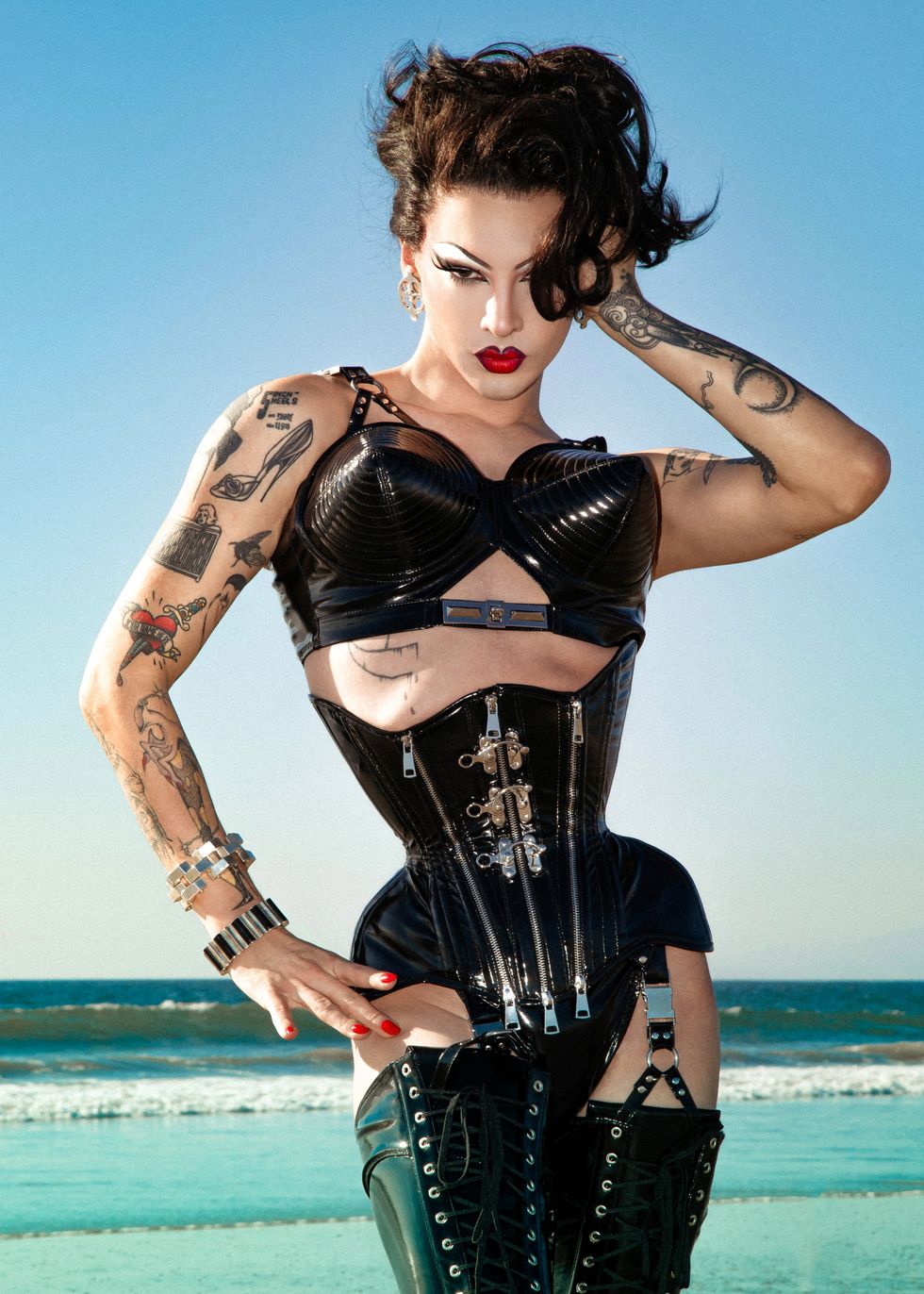
Of course, Chachki has made a name for herself beyond the world of cabaret, both in fashion, and from running her mouth. The effects of that habit occasionally consume her life. “I did this to be a punk, rebellious thing, and now I’m like, ‘Hopefully stamps.com will sponsor my podcast.’ It’s gone in a different way than I had ever expected,” she says. Even now, she struggles to balance the reaction to her from fans of that aforementioned television show, and her desire to be known for what she loves, not what she’s said. “I’m doing an episode of “The Pit Stop,” it’s coming out, and I’m scared to be honest. It’s like, it’s the opposite of punk,” Chachki says. “This is not how I started doing drag, and it’s changed so much. I’m like, dude, I’m talking about someone’s fucking shoes. Who the fuck cares? This is not that serious.”
She’d much rather focus on taking her clothes off, for a price: “I think the main thing about burlesque is it’s all about glamor. It’s not necessarily about real talent.” She’s always loved that tension in the craft, and clarifies: “Not that there’s not a talent to it, but I think it’s mostly about production, and glamor. It’s not necessarily what you do, but how you do it. Finding a gimmick, and knowing that you have star power, and using literal glamor, like beads and feathers and rhinestones, to dazzle an audience. I think there’s a crossover there, the extremes, that I was always really drawn to.”
Chachki also feels she owes her career in part to the “faggots behind the scenes rooting for me,” faggots she’s met in “any opportunity that I’ve ever really had in my life.” Her earnestness sharpens to a knife’s edge. “That is really the truth. It’s never been some random PR team, it’s never been some random person,” she says. “No, there’s a gay dude in power who recognizes what I’m doing, sees value in what I’m doing, and takes a risk and puts me up for the role, or the casting, or whatever, and is fighting for me behind the scenes.”
Read our full conversation below.
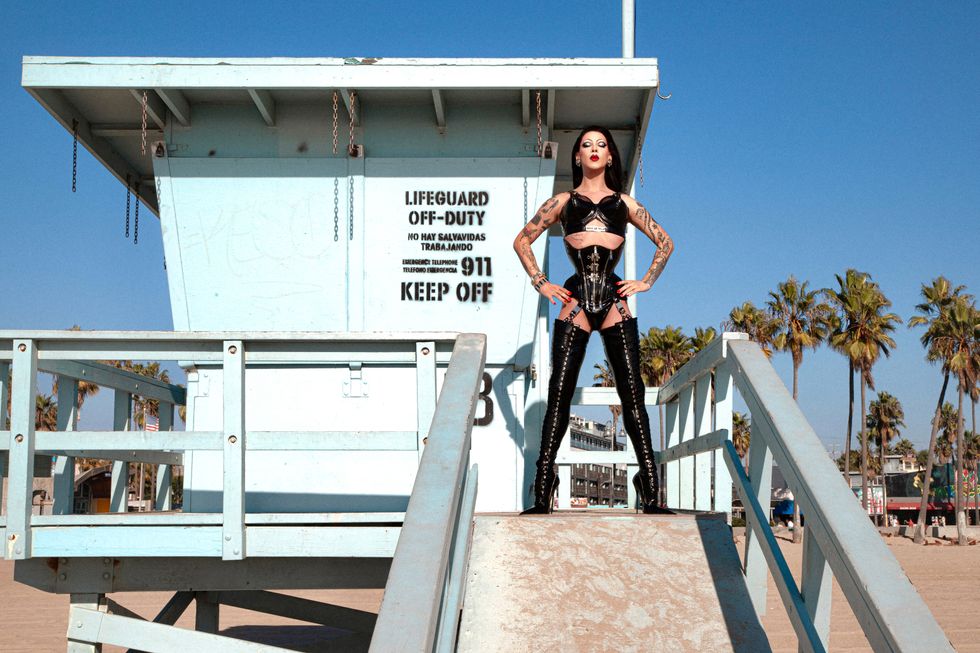
I want to get to your Vogue cover in a second, but you said you’ve referenced Crazy Horse repeatedly. I feel like certain types of creatives would take umbrage with those types of references, those homages, in dance or theater or even drag. But it seems like they’ve had the opposite reaction, and it’s opened up this possibility for you in the first place.
I’d call mine more of a respectful homage. But also, I was so bad. I think it was more like, “Aw, she tried! That’s so cute!” Less of: “Oh, wow, this person’s profiting off our hard work.” But it’s interesting, there’s a lot of rip-offs out there, it’s been referenced a lot. People don’t even know Beyoncé filmed her whole “Partition” video there. People associate those specific acts with Beyoncé now, and it’s Crazy Horse, which has been around since 1951, doing these amazing acts.
I think that’s the beauty of drag, because it removes some of the pretension when you reference or pay homage to certain things. Along that line, you’re always marrying these drag and burlesque and cabaret in your work, from the beginning. What draws you to that creative intersection?
I think that’s why I’m drawn to drag in the first place. It’s all encompassing creativity, and the extremes of it all, and I think burlesque goes hand in hand with that. I’m also a very sex positive person. Burlesque has always been almost... seedy? Now it’s transformed, but I always thought it was a bit more punk to be taking your clothes off then just like, singing a song or something. It’s the same thing with drag. There’s something there with crossdressers and strippers being comparable to like, the underbelly of entertainment, if you will.
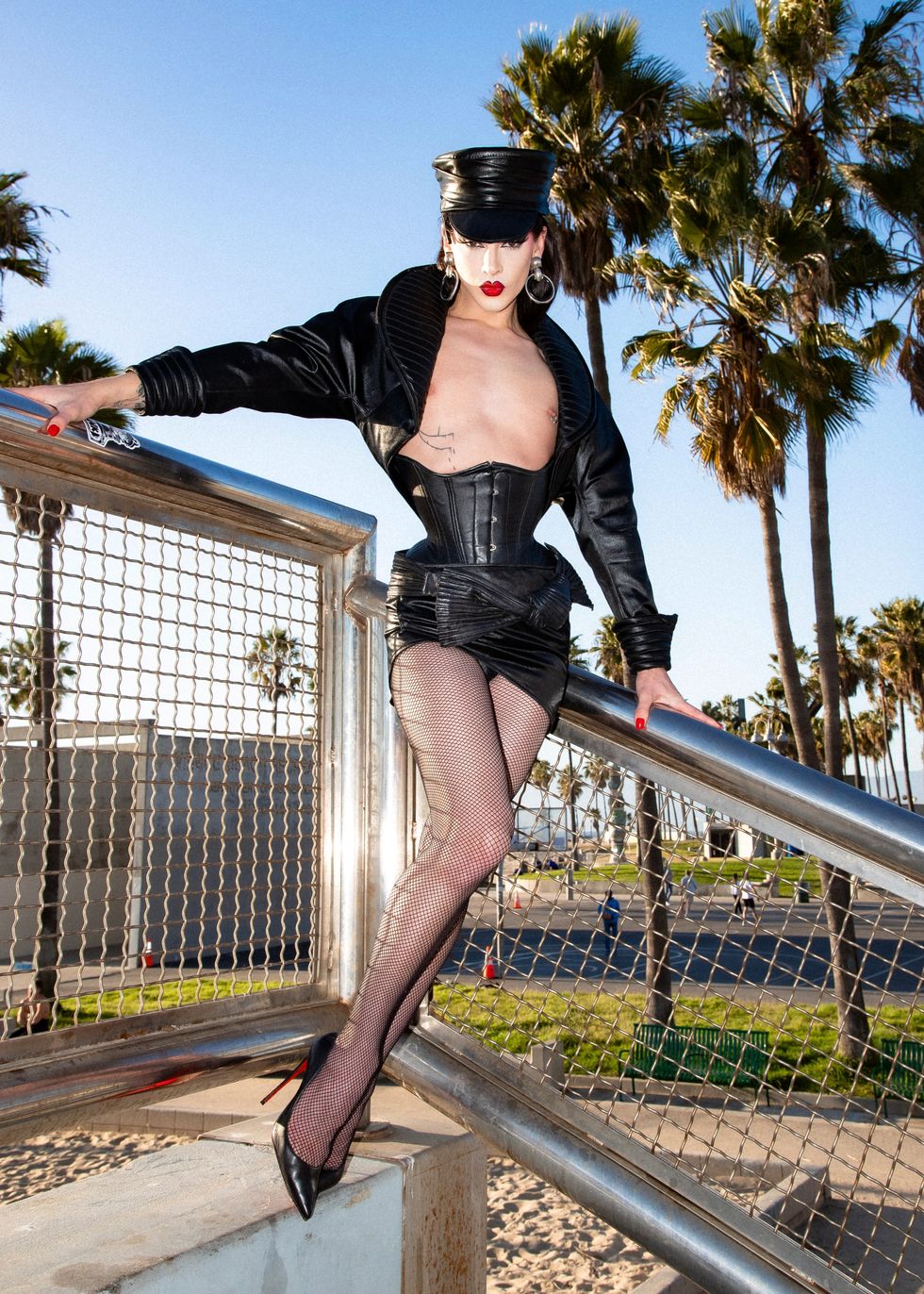
A quote of yours recently went around about there being too many drag queens right now. It is a sentiment I hear a lot, just like, anyone can put on a wig and heels, but what are you doing after? Do you feel like the comment was misconstrued at all? Is it something that maybe a lot of queens of your generation are feeling at the moment?
I mean, it was definitely misconstrued, because the interview was supposed to be about Crazy Horse, and the headline is that there’s too many drag queens. At first I was like, oh, that’s so out of context. I think the interviewer was asking me like, do you keep up with so and so and all these different franchises, drag queens. I was like, I can’t, I’m overwhelmed. Even RuPaul doesn’t know Jinkx’s name, like.
While prepping for this interview, I realized drag queens have been assimilated into more mainstream clickbait-type websites. One of the top results for you was that you are allegedly the eighth-richest drag queen in the world. How does that feel?
I feel like that’s a lie!
I read the list — these are some very specific numbers.
The eighth richest drag queen... that is very specific! I’m trying to think of who would be seven, sixth, fifth, etc. I mean, RuPaul’s number one. The thing is, I spend my money on clothes and rhinestones and shit! I don’t know how they’re measuring my wealth. I’m very Carrie Bradshaw. I like all my money where I can see it, in my closet.
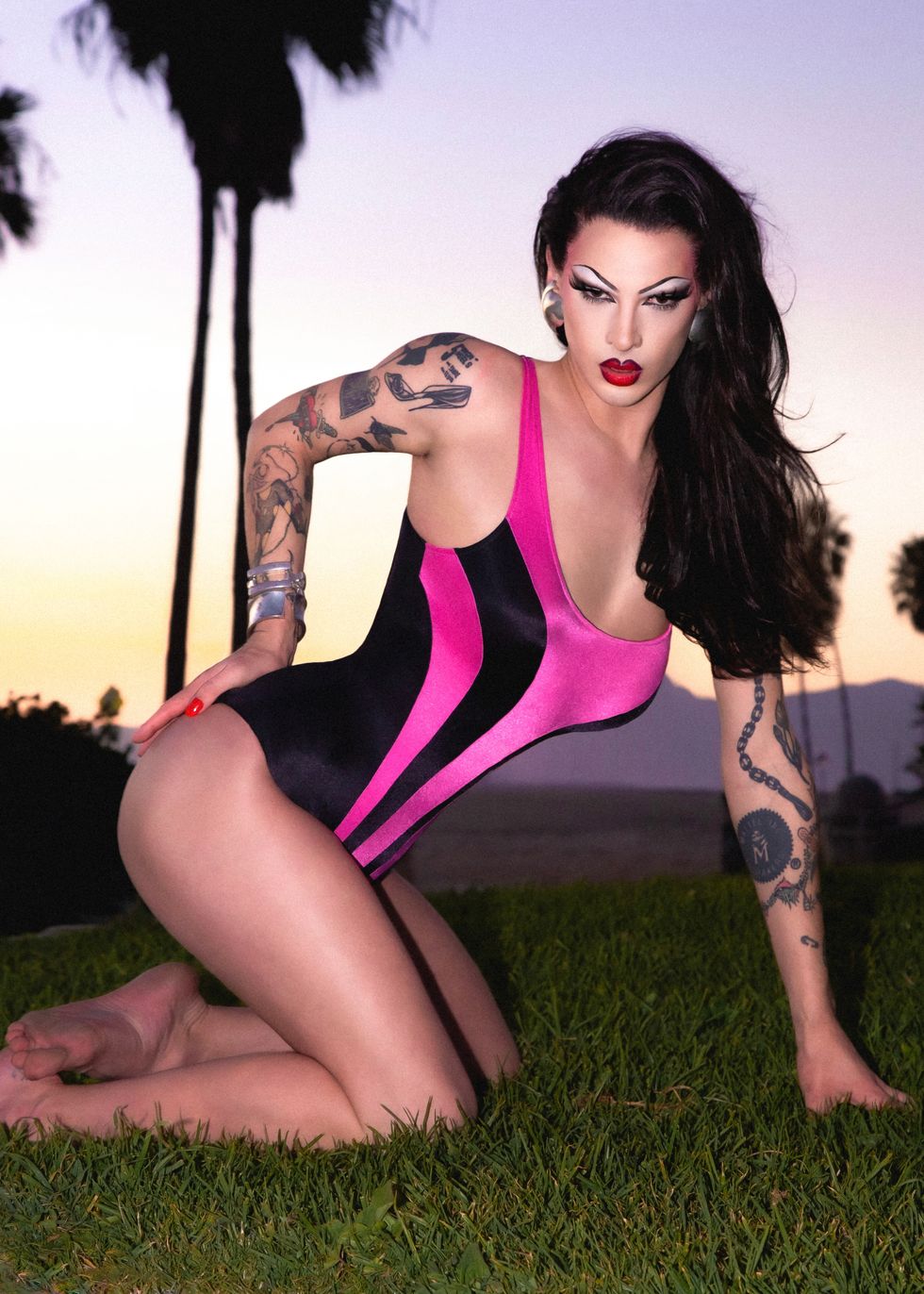
You signed to UTA last year, and I read about it in WWD at the time. It’s a new thing, to read about drag queens in the trades more and more, and I’ve been doing entertainment reporting for a while. How has that shift been for you?
The entertainment industry is just crazy, especially Hollywood vibes. Amanda Bynes, Britney Spears, all of these people, it makes sense how they get to that point. The drag world has kind of created this Wild West community of promoters, bookers, agents, managers, people from my generation of drag, and I feel like a fucking 100 year old grandmother right now. But it’s true, we really created an industry. Now we’re seeing people that have traditionally worked in the music space, the comedy touring space, realize: “Oh, those bitches are making money over there. We need to tap into that.” We’re just now seeing that, and there’s pros and cons to it. I really don’t even know how I feel about it yet. I don’t even know what the word is. Not pinkwashing, but like: Now you want to fuck with us? Because there’s money involved?
When money is raining from the skies!
Oh, now that you can see there’s money, now we’re about it. It’s like Target putting out Pride merch, and then taking it off shelves when shit hits the fan. It’s the same thing with my family. The second I got on Drag Race and won $100,000, they’re like, “Amazing! We love you!” Oh, so now there’s money involved, it’s okay? Then it’s like, am I a sellout? I did this to be a punk, rebellious thing, and now I’m like, “Hopefully stamps.com will sponsor my podcast.” It’s gone in a different way than I had ever expected. As I said, there’s pros and cons. Like, these talent agencies! Before UTA I was also signed with CAA, and it’s like, they have good intentions, but sometimes they don't know the drag space. They just don’t get that you can’t really put us into a box. We’re not really musicians 100%, we’re not really actors 100%. We’re not really comedians 100%. We’re all of that, and then more.
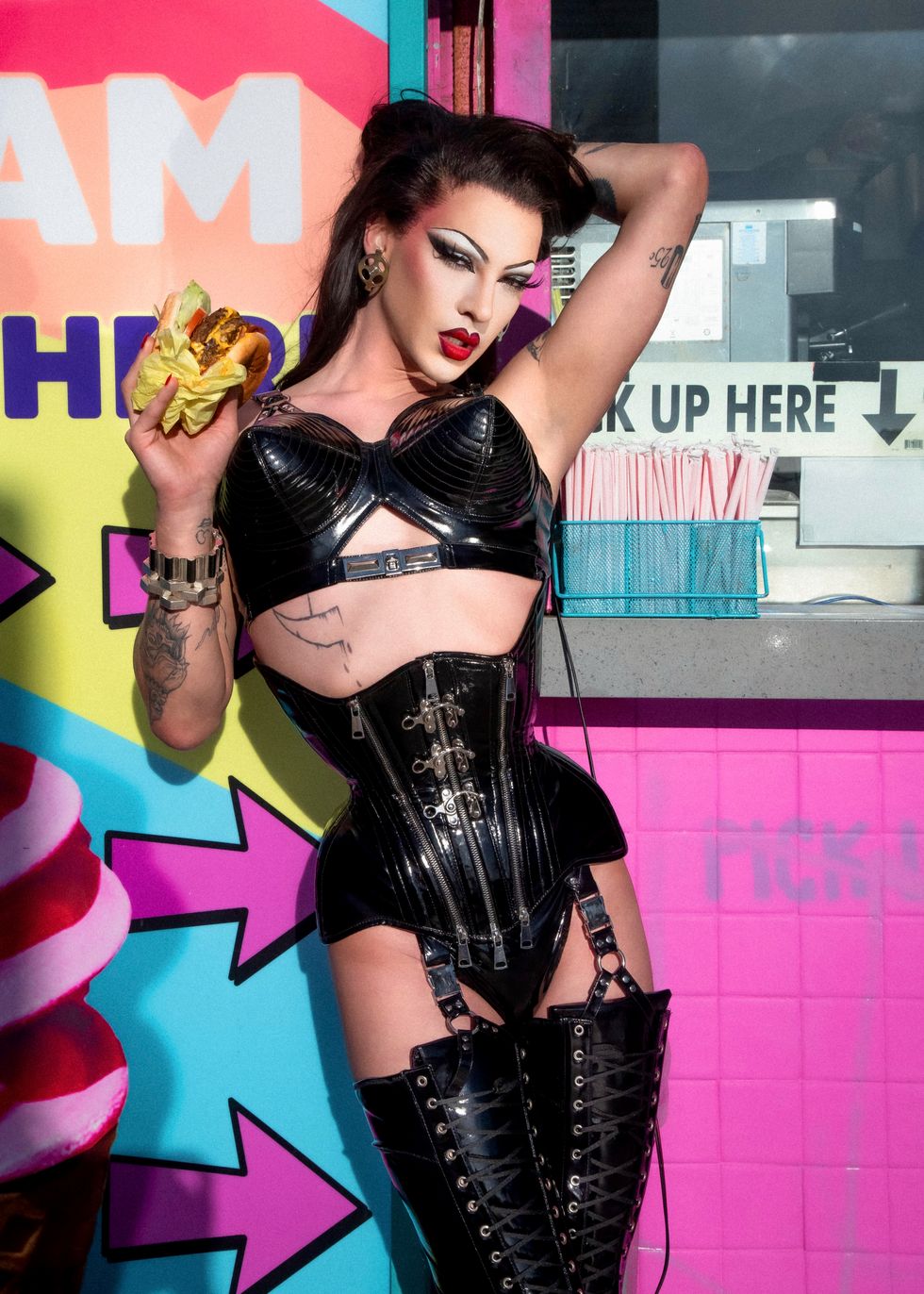
You were one of the queens that helped pave the way for queens in the modern fashion industry to be more publicly involved. Do you ever look back now, as you see more queens breaking into the fashion space, and be like: I really did that?
Absolutely. Lately, I’ve been looking back. I still have special moments in the fashion space, but there were a good couple years that it was just so special. I knew at the time that it was special. I’m like, damn, I really was that girl. I did it for real! It’s maybe never going to happen to me ever again. Forget the other girls, even for me, I’m like wow, that was such a special time in my career. I’m so grateful that I got to do those things and meet those people.
Speaking of career milestones, the Vogue Czechoslovakia cover made you the first Drag Race contestant to ever be on the cover of Vogue. You said before in our conversation, and at the time of the cover, that now you have to make new dreams, because you’ve achieved all of yours. Have you thought about what’s next?
My whole work life balance has been off for so long. I really want to channel all of the creative energy that I have, that I’ve put into Violet, into another avenue. Whether that’s fashion design or creative direction or styling, I just have an innate desire to be creative in this similar way to how drag is formed. I don’t see myself doing drag forever, so there’s a lot of stuff that I’m trying to work on, on the side.
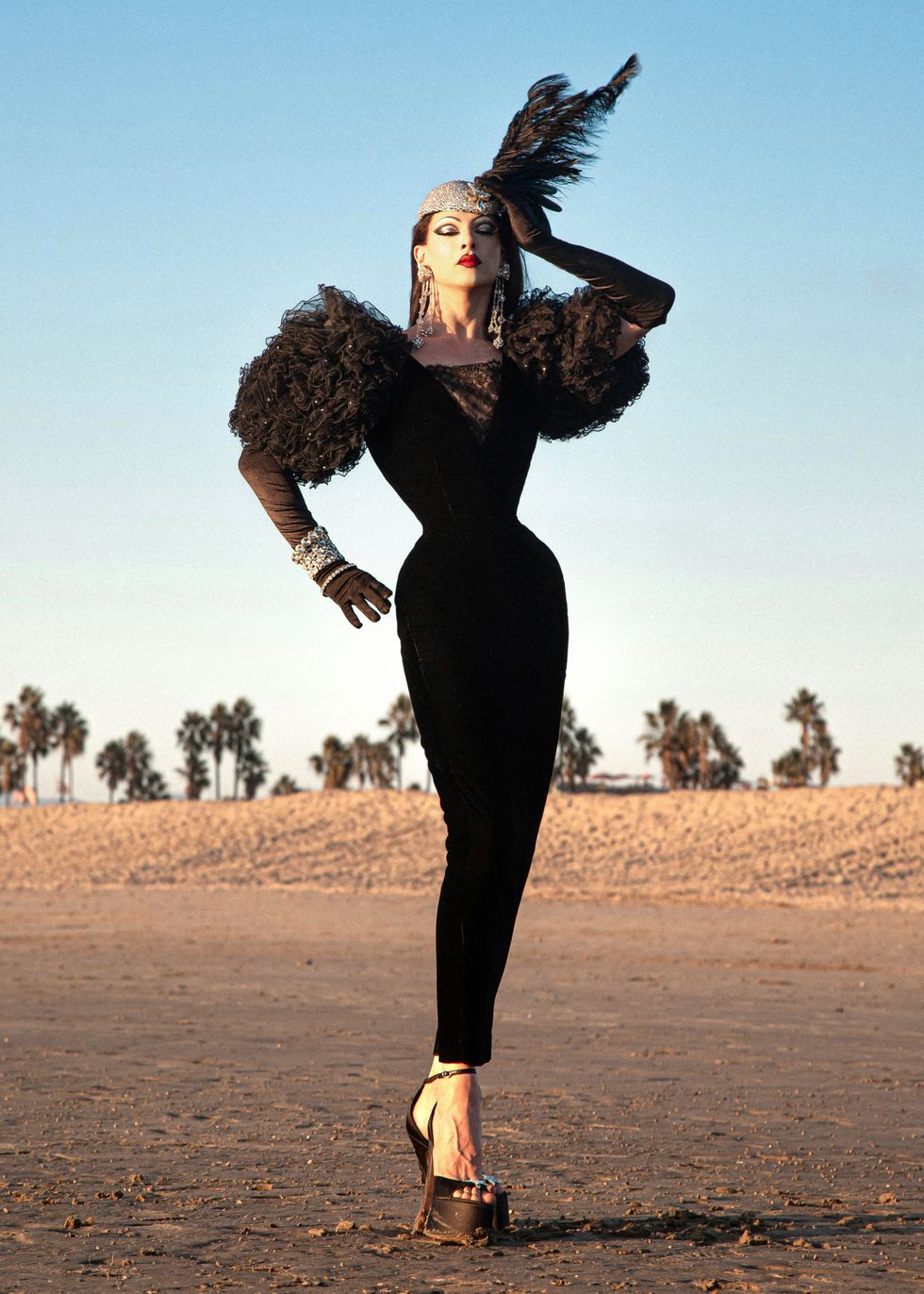
Did Crazy Horse work with you on costumes, or did you show up with designs already?
They were like, you’re going to be in control of all costumes and you’ll figure everything out. I hit up some of my designer friends and got some designer pieces in the show. I don’t want to divulge too much yet, but there’s not a whole lot physically done yet. There’s sketches and stuff, but everything is going to be new, from up-and-coming designers.
It’s hard to marry fashion and performance wear. The performance is precise and difficult, and timed, and there’s moving stages and platforms and wheels and things coming from the ceilings and poles, and I’m doing high kicks and back bends and having to stretch every day, and it’s rigorous, like a real show girl. It’s almost like, gymnastics level. I’m lucky I’m very flexible.
But definitely expect high-glam fashion. Crazy Horse is really known for being modern, cutting-edge, and I really want to bring a big dose of classic drag. I’m honoring what Crazy Horse has always been and bringing something elevated as well.
You’ve talked a lot about growing up in the Atlanta drag scene, and how the queens backstage can be rotted. Have you found that burlesque performers, or other nightlife type performers, are the same way backstage? Or is it a completely different energy than you’re used to?
Completely different. Everyone in the burlesque world that I’ve ever met is the most supportive person, to the point where I’m like, all right, you guys, there’s no way that everyone here is like a yes person all the time. It’s the polar opposite. Especially compared to when I was growing up in Atlanta. There is something about the rottenness that I miss, because it was so unserious. Underneath all of that, there is such a strong community, and we have this lived experience of being gender nonconforming queer people. There’s an underlying, familial sisterhood that I really miss, from being a local queen.
I don’t know! Maybe it’s toxic. Maybe I’m fantasizing about a toxic work environment, but I loved it. There’s something really special about having castmates, and having that family, where you can be honest and joke and laugh and laugh at yourself. It shouldn’t be that serious. Even now, I’m doing an episode of “The Pit Stop,” it’s coming out, and I’m scared, to be honest. It’s like, it’s the opposite of punk. This is not how I started doing drag, and it’s changed so much. I’m like, dude, I’m talking about someone’s fucking shoes. Who the fuck cares? This is not that serious. You guys, it’s not like we’re curing cancer, we’re not saving lives, this is purely distraction, purely entertainment, purely fantasy. At the end of the day, this stuff truly does not matter.
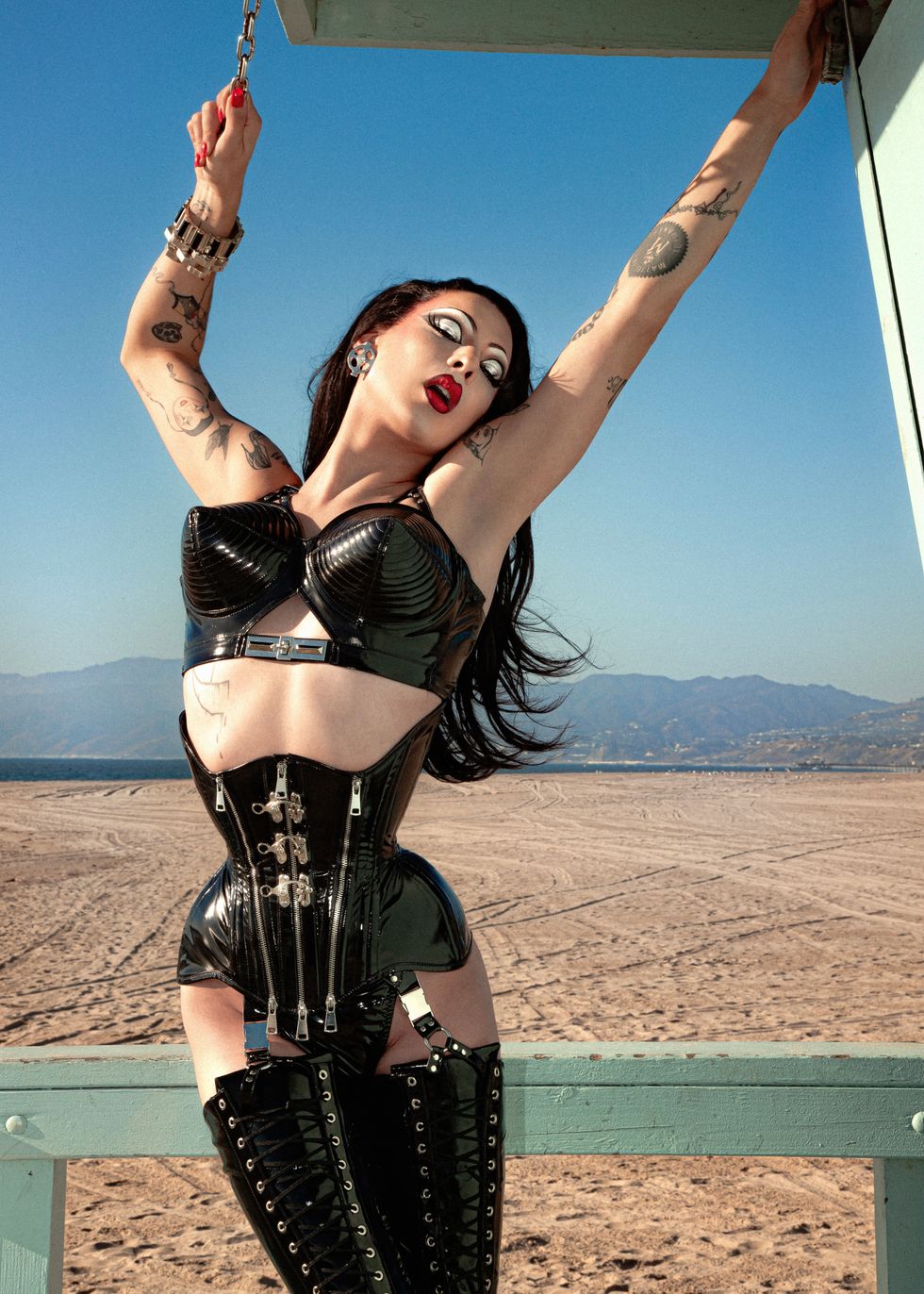
My own personality was definitely shaped by Joan Rivers, on Fashion Police. Tongue-in-cheek, everyone is in on the joke. Now you can’t talk like that anymore. The girls get me together in the Instagram comments if I crack jokes about a dress on the red carpet, like I’m going to prison over it.
Then it’s like, fine, I’ll keep my opinions. We have to say it in secret amongst friends. Send them a voice note. You can’t even fucking text a bad opinion now.
Yeah, someone will post it, and then you’ll be in a receipt war with the latest queens. I mean, your legendary “Pit Stop” episode has, I think, like 100 different videos named “Violet Chachki reading the girls compilation.” There’s a whole culture to it now. It must be weird to see that get disseminated so widely.
It definitely is. It’s giving me this reputation of being mean, or a villain. I’m actually the softest! I’m a cry baby. I’m a scared cat. I’m soft. I guess it’s the Gemini in me that I can do both — duality or whatever. It is weird because to me, this is supposed to just be funny. It’s supposed to be silly. This is silly. We’re men in wigs making fun of society. I have this next one coming, because they like me for the balls. I’m like, you guys, this hasn’t scarred me, but I also don’t want “The Pit Stop” and me critiquing the outfits to overshadow the work that I’m actually doing.
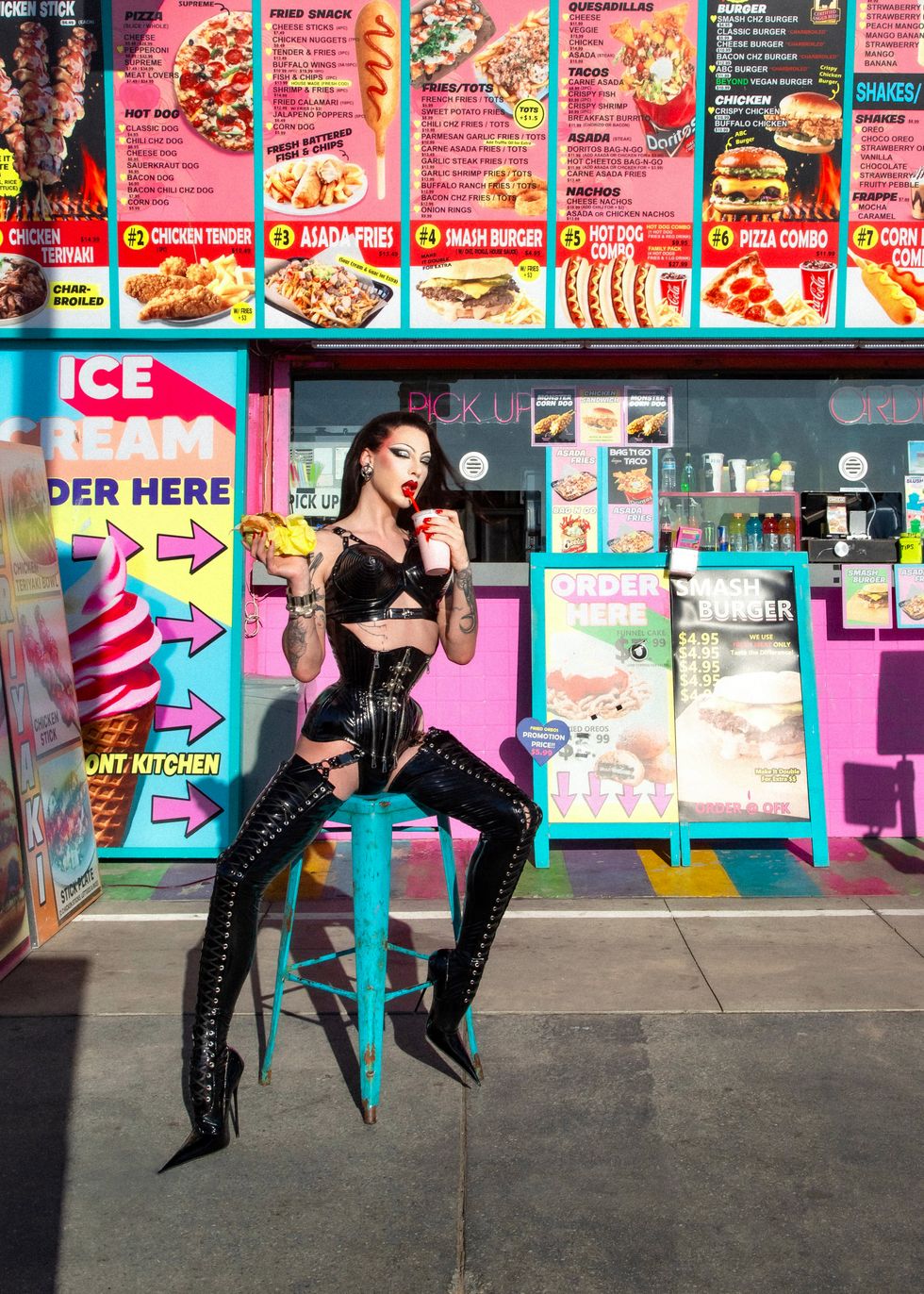
Is there a burlesque or cabaret number that is just iconic, legendary, or one you go back to the most?
I’m bringing back a number that I performed when I started out doing drag in like, 2012. There’s actually a video of me doing it. It was part of a show called The Other Show, in Atlanta. High glitz, glamor, and I remember showing the creative director at Crazy Horse and telling her I want to do this number. It’s from 2012. I look so ugly, and bad, and they were like, “I don’t know.” I was like, no, no, it’s going to be good. I’m going to redo it, and redo the whole thing. So I’m doing that.
I don’t want to divulge too much, but the premise of the show is showing Paris, showing Crazy Horse. Then like, who Violet is, where I come from, what kind of drag I do. Basically old school, high drag. Then the second part is me adapting a Crazy Horse number, one of the iconic ones. I’m really afraid people, especially Parisians, are going to be shocked. I’m changing the music, changing the choreography, changing the lighting, changing the costumes, everything. Then the next part is me with the Crazy Horse girls, trying to become a Crazy Horse girl, and do everything as they do in perfect synchronicity. It’s the hardest one, trying to become one of the Crazy Horse girls. The last part of the show is really me, alone, solo, doing a combination of everything. The whole through line is introducing me to Crazy Horse, introducing Crazy Horse to me, and then mashing the two up.
I also don’t think people know how iconic the Crazy Horse show is. Even my friends in France, they’re like, “Oh, I’ve never been, I’m going to go when you’re there.” I’m like, this is the most amazing show I’ve ever seen in my entire life you guys. We have to honor these things, don’t you want things to be around? Even the Lido in Paris just closed, which is an iconic cabaret. This is one of the most erotic, sex positive, femme supporting spaces I’ve ever been into. It’s really surreal. You get to turn your brain off for an hour, watch beauty and strength and femininity.
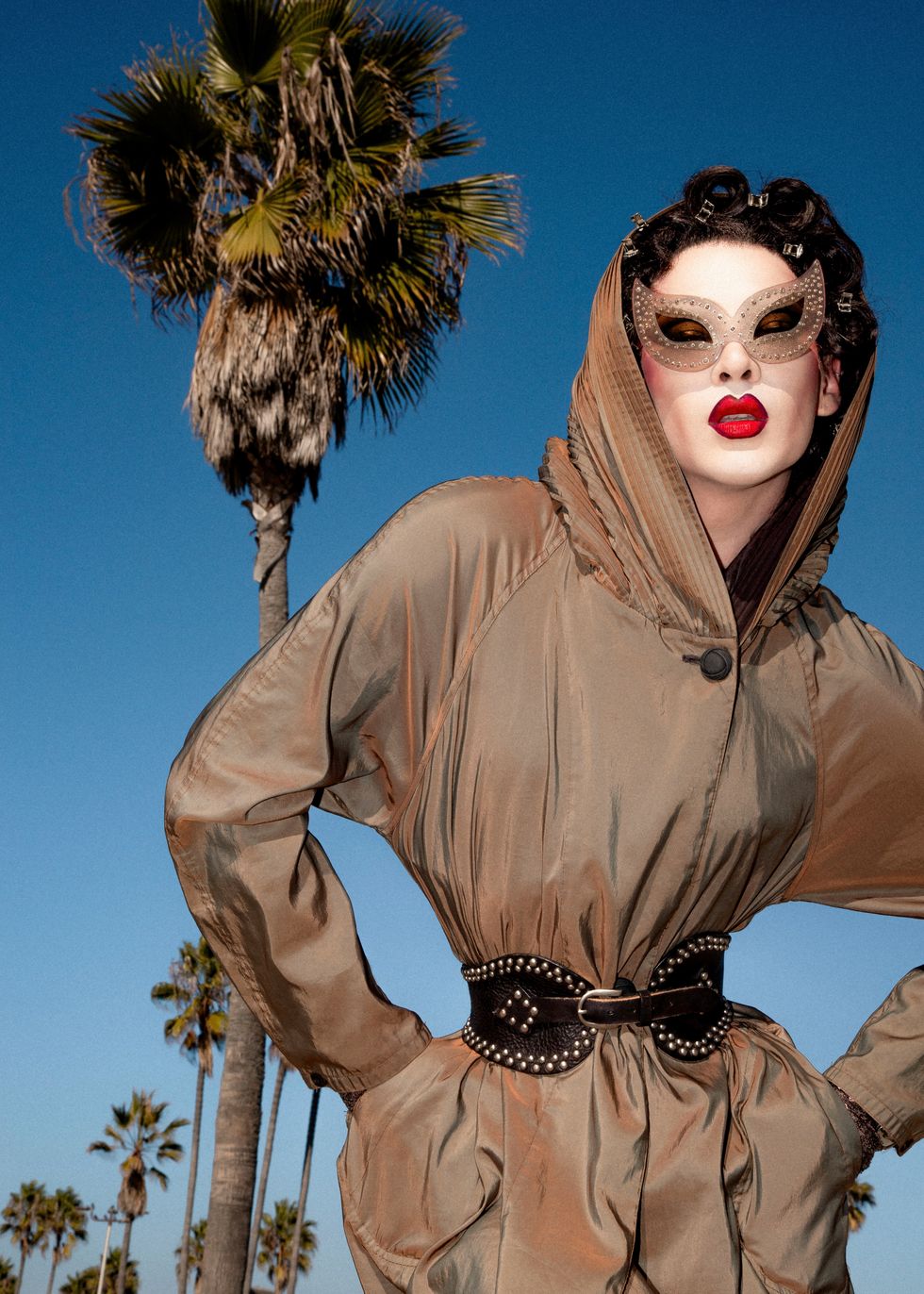
Last question, I need another gay Twitter clickbait quote, to run as the headline. So if you’ll excuse me asking…
I love that!
In a fantasy scenario, they’re like, “We want to remake Burlesque.” The Christina Aguilera vehicle, famously. Would you want to star in Burlesque: Part Two?
Burlesque is like, the funniest movie ever. I love it, but I think they called it Burlesque because the name Cabaret was already taken. That’s something Dita Von Teese has actually said before. She’s not really doing burlesque in it. But I’m definitely in that movie. I want to be the villain who pulls the plug on the music. Or I can be Christina, whatever, I’d have to learn how to sing. Maybe we do Burlesque: Part Two, and it’s about a drag queen.
It could be like a biopic for you, set in the Atlanta drag scene, and you’re fighting the pageant queens to get them to accept your style of drag. I don’t know, they can come up with it.
And that was my reality! It really was, believe it or not. I was like, alternative back in the day amongst all the pageant, trans show girl performers. They were like, there’s the flat chested one that wears pasties. I was a freak to them. I was the underdog back in the day, so there. It’s a true story.
From our lips to the ears of the president of Sony Pictures!
Photography: Thomas Angeli
Styling: Hunter Clem
Styling assistant: Genesis Webb
From Your Site Articles
- Violet Chachki Models Rising Designer Luis De Javier ›
- Violet Chachki Closed Kinky Moschino Show in Devil Horns ›
- Violet Chachki Is 'The Perfect Girl' in Mareux's New Visual ›
- Violet Chachki and Gottmik Throw a ‘Deadly Doll Ball’ - PAPER Magazine ›
- Violet Chachki and Gottmik Are Beefing on New Single “TKO” - PAPER Magazine ›
Related Articles Around the Web
MORE ON PAPER
ATF Story
Madison Beer, Her Way
Photography by Davis Bates / Story by Alaska Riley
Photography by Davis Bates / Story by Alaska Riley
16 January
Entertainment
Cynthia Erivo in Full Bloom
Photography by David LaChapelle / Story by Joan Summers / Styling by Jason Bolden / Makeup by Joanna Simkim / Nails by Shea Osei
Photography by David LaChapelle / Story by Joan Summers / Styling by Jason Bolden / Makeup by Joanna Simkim / Nails by Shea Osei
01 December
Entertainment
Rami Malek Is Certifiably Unserious
Story by Joan Summers / Photography by Adam Powell
Story by Joan Summers / Photography by Adam Powell
14 November
Music
Janelle Monáe, HalloQueen
Story by Ivan Guzman / Photography by Pol Kurucz/ Styling by Alexandra Mandelkorn/ Hair by Nikki Nelms/ Makeup by Sasha Glasser/ Nails by Juan Alvear/ Set design by Krystall Schott
Story by Ivan Guzman / Photography by Pol Kurucz/ Styling by Alexandra Mandelkorn/ Hair by Nikki Nelms/ Makeup by Sasha Glasser/ Nails by Juan Alvear/ Set design by Krystall Schott
27 October
Music
You Don’t Move Cardi B
Story by Erica Campbell / Photography by Jora Frantzis / Styling by Kollin Carter/ Hair by Tokyo Stylez/ Makeup by Erika LaPearl/ Nails by Coca Nguyen/ Set design by Allegra Peyton
Story by Erica Campbell / Photography by Jora Frantzis / Styling by Kollin Carter/ Hair by Tokyo Stylez/ Makeup by Erika LaPearl/ Nails by Coca Nguyen/ Set design by Allegra Peyton
14 October




